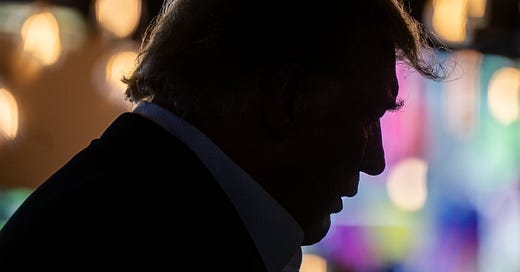Trump Shoots Himself in the Foot with Demand for Trial Date in 2026
This is no way to establish credibility with a federal judge.
ON THURSDAY, DONALD TRUMP FIRED his first shot in Judge Tanya Chutkan’s courtroom—straight into his own foot. His lawyers proposed to the district court judge that his federal trial on conspiracy and obstruction charges related to the aftermath of the 2020 election and the events of January 6th should not occur until April 2026.
“I’ll eat my hat if Judge Chutkan agrees with Trump to start this trial in 2026,” tweeted Neal Katyal, the former acting solicitor general of the United States. “He’s just afraid to stand trial. Nothing more.”
Katyal’s hat is safe. Trump’s proposal on the all-important trial date sends an unintended message: that Trump is pressing his lawyers to take legal positions so extreme that they will be entirely disregarded.
Credibility with judges is the coin of the realm for trial lawyers. Squander it early and it’s hard to retrieve.
Trump’s past pattern is that his lawyers lose credibility by kowtowing to his absurd, uninformed demands. Then he tosses them like bad pennies. Sooner or later, it’s tough attracting the gold standard in the legal profession.
The Trump team’s tissue-thin pretext for their ludicrous trial date request was the volume of discovery materials they need to read.
They wrote that reviewing millions of documents and electronic communications that the government already gave them would be like reading “the entirety of Tolstoy’s War and Peace, cover to cover, 78 times a day” in order to finish by the January trial date proposed by Special Counsel Jack Smith.
Sounds daunting. But in the modern litigation world, a high-tech industry has grown up specializing in managing big-document cases. Entire firms exist to tackle discovery jobs like this.
Huge volumes of documents can be scanned rapidly, and put in a single database alongside digital communications and other information. The database is then “deduped” (that is, duplication is reduced) and organized to allow instant retrieval of any important piece of evidence. A lawyer need only search for specified keywords, dates, subjects, titles, witnesses, senders, receivers, contact information, and so on. For example, a search for documents or data related to “January 6/electors/certification” will quickly bring up the relevant items for review, highlighting, organizing, and sharing with team members.
Former U.S. Attorney Joyce Vance, speaking on MSNBC on Friday, mocked the misleading analogy to Tolstoy’s 1,200-page epic. “You don’t need to read War and Peace 78 times a day. You simply search for ‘Natasha,’” Vance said, referring to the novel’s lead female character.
An experienced judge like Chutkan has seen many teams of lawyers prepare competently for trial in more legally and factually complex cases involving databases larger than in Trump’s case—and do it in far less time than Trump has requested.
One read of the D.C. grand jury’s indictment would demonstrate that this case can be set for trial in months, not years. Judge Chutkan understands that the grand jury’s streamlined charges are “built for speed.” And an experienced, organized trial lawyer like Smith will present one main vein of evidence to prove all four felony counts.
AGAINST THIS BACKGROUND, Trump’s laughable 2026 trial date proposal will lose Judge Chutkan’s trust for his lawyers faster than a bullet fired at someone standing in the middle of Fifth Avenue.
As former prosecutors and civil litigators, we routinely faced these common tactical questions: How do I pitch my position to the court to persuade it? Do I stake out a far more extreme position than needed and hope to expand the “midpoint” that will be chosen by the judge? Or, do I start with a Goldilocks “just right” proposal, easy to defend when questioned by the judge?
Establishing credibility is the North Star. You want the court to turn first to your team for reliable answers on the scores of issues that will arise in the trial process.
Almost certainly, Judge Chutkan will set a trial date before the November 2024 election and make every effort to stick to it. In one of the most important trials in American history, she will not want justice delayed until after voters have made their decisions in a crucial presidential election.
It would have been more savvy for Trump to propose as late a date in the 2024 campaign calendar as reasonable, or perhaps just a smidgen beyond. But by proposing a date on the far side of bonkers, Trump has encouraged Judge Chutkan to ignore his papers as she picks the earliest date that gives him adequate time to prepare.
Trump himself may be thinking that a denial of his extravagant trial-date request will set up one more “rigged trial” meme for his base. Trump is innocent until proven guilty, but he knows that the evidence against him is overwhelming. He appears to believe that his only get-out-of-jail-free card is to bamboozle enough voters to get elected, so that upon his return to the White House he can order his new attorney general to drop the cases against him.
In any event, the “rigged trial” refrain will ring hollow beyond a minority of general election voters if an early trial is set and he is convicted.
To be clear, Judge Chutkan is unlikely to pick Jack Smith’s plausible but ambitious January 2024 trial date. Trump already has E. Jean Carroll’s second defamation trial on January 15, and a class-action fraud trial set for January 29.
Though criminal trials often take priority over civil trials, Judge Chutkan is likely to allow time for those other short trials to finish, and then provide a brief buffer period for Trump to complete preparation for the conspiracy and obstruction trial in her court.
Look for a spring 2024 trial date to be set.








